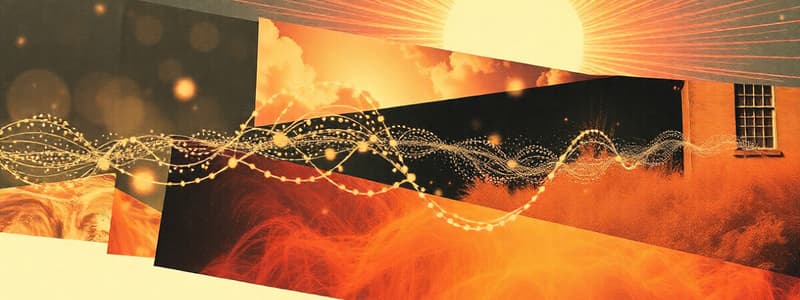Podcast
Questions and Answers
What is the SI unit used to express radiant energy?
What is the SI unit used to express radiant energy?
- Watt (W)
- Newton (N)
- Volt (V)
- Joule (J) (correct)
Which of the following statements is true about radiant energy?
Which of the following statements is true about radiant energy?
- It travels through matter as a medium.
- It can be transferred by electromagnetic waves. (correct)
- It can only be created by chemical reactions.
- It is exclusively in the form of visible light.
What technique is primarily used for measuring electromagnetic radiation?
What technique is primarily used for measuring electromagnetic radiation?
- Chromatography
- Calorimetry
- Spectrometry
- Radiometry (correct)
In what two ways can electromagnetic radiation be conceptualized?
In what two ways can electromagnetic radiation be conceptualized?
What ultimately led to the discovery of infrared radiation in the electromagnetic spectrum?
What ultimately led to the discovery of infrared radiation in the electromagnetic spectrum?
What does Planck's equation, E=hf, relate in quantum mechanics?
What does Planck's equation, E=hf, relate in quantum mechanics?
Which of the following statements about photons is true?
Which of the following statements about photons is true?
How does electromagnetic radiation behave when interacting with materials?
How does electromagnetic radiation behave when interacting with materials?
Which type of radiant energy is associated with the process of nuclear fusion?
Which type of radiant energy is associated with the process of nuclear fusion?
What is one effect of the absorption of photons by an object?
What is one effect of the absorption of photons by an object?
What is the speed of electromagnetic radiation in a vacuum?
What is the speed of electromagnetic radiation in a vacuum?
What were gravitational waves theorized to emerge from according to Einstein's theory?
What were gravitational waves theorized to emerge from according to Einstein's theory?
Which application utilizes radiant energy from the Sun?
Which application utilizes radiant energy from the Sun?
What is a method of measuring radiant energy?
What is a method of measuring radiant energy?
In which part of the electromagnetic spectrum is ultraviolet light found?
In which part of the electromagnetic spectrum is ultraviolet light found?
Flashcards
Radiant Energy
Radiant Energy
Energy transferred by electromagnetic and gravitational waves, capable of traveling through a vacuum.
Electromagnetic Waves
Electromagnetic Waves
Waves that carry radiant energy and include visible light.
Radiant Energy Transfer
Radiant Energy Transfer
Energy moving through space as waves that don't need matter to travel.
Electromagnetic Spectrum
Electromagnetic Spectrum
Signup and view all the flashcards
Radiometry
Radiometry
Signup and view all the flashcards
Photon
Photon
Signup and view all the flashcards
Planck's Equation
Planck's Equation
Signup and view all the flashcards
Gravitational Radiation
Gravitational Radiation
Signup and view all the flashcards
Radiant Energy
Radiant Energy
Signup and view all the flashcards
Electromagnetic Spectrum
Electromagnetic Spectrum
Signup and view all the flashcards
Nuclear Fusion
Nuclear Fusion
Signup and view all the flashcards
LIGO/Virgo
LIGO/Virgo
Signup and view all the flashcards
Energy Level (photon)
Energy Level (photon)
Signup and view all the flashcards
Planck's Constant
Planck's Constant
Signup and view all the flashcards
Radio Astronomy
Radio Astronomy
Signup and view all the flashcards
Study Notes
Radiant Energy Overview
- Radiant energy is energy transferred by electromagnetic waves and gravitational waves.
- It travels through a vacuum, unlike sound or water waves, which require a medium.
- Measured in joules (J).
- A mechanism for energy to enter or leave a system (e.g., campfire, clapping hands).
- Visible light is a form of electromagnetic radiation.
- There's a larger electromagnetic spectrum beyond visible light, including infrared.
How Radiant Energy Works
- Classical physics: Radiant energy as oscillating electric and magnetic fields perpendicular to each other and the direction of energy transfer.
- Quantum mechanics: Radiant energy in the form of photons, the smallest units of electromagnetic fields, with energy proportional to frequency (E=hf).
- Photons interact with matter at the atomic level. They can be absorbed, re-emitted, or reflected.
- Travels at approximately 300,000,000 meters per second in a vacuum
- Can be reflected and refracted
Electromagnetic Spectrum
- Radio waves, microwaves, infrared, visible light, ultraviolet, X-rays, and gamma rays, ordered by increasing frequency.
- Each type with specific uses (e.g., radio waves for communication, X-rays for medical imaging).
- Part of the EM spectrum was discovered by William Herschel's experiments.
Measuring Radiant Energy
- Radiometry uses radiometers to quantify radiation flux (power) in watts or joules per second, which helps make images.
- Radiometry is essential for radio astronomy and remote sensing.
Radiant Energy Examples
- Gravitational radiation, from sources like neutron stars, also travels at approximately 300,000,000 meters per second.
- All energy on Earth originates from the sun, including nuclear energy from stars' fusion processes.
Uses of Radiant Energy
- Radio astronomy, optical astronomy, and telecommunications utilize radiant energy.
- Solar energy collectors capture solar radiation and convert it to chemical energy then electricity.
- Other technologies use radiant energy, including thermal heating lamps, light bulbs, and screens.
- Detecting and measuring Gravitational waves with LIGO and Virgo Interferometer. Measurements done using laser interferometry.
Collecting Radiant Energy
- The Sun is the primary radiant source for Earth.
- Nuclear fusion in stars produces radiant energy, converting hydrogen to helium. Stars eventually die, releasing elements into space.
- Earth's elements (formed by the accumulation of matter after supernovae) are then drawn into planets. The Sun's radiation drives weather and the water cycle.
- Life utilized radiant energy for survival and photosynthesis, then fossil fuels, as well as other radioactive materials provide sources.
- Radioactive elements decay, releasing radiant energy. This energy can be harnessed for electricity via nuclear power plants.
Studying That Suits You
Use AI to generate personalized quizzes and flashcards to suit your learning preferences.




